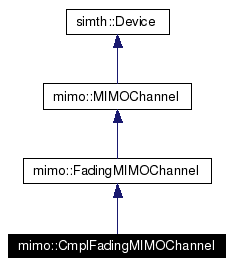
#include <fadingmimochannel.h>
Inheritance diagram for mimo::CmplFadingMIMOChannel:

Public Member Functions | |
| CmplFadingMIMOChannel (int deviceID, DeviceSystemIntf *system, const simth::PropertyList &pl) | |
| constructor | |
| virtual | ~CmplFadingMIMOChannel () |
| destructor | |
| void | refresh () |
| determines new random transfer factors | |
| virtual void | print (std::ostream &os) const |
Related Functions | |
| (Note that these are not member functions.) | |
| propertylist_CmplFadingMIMOChannel (not_a_function) | |
The entries of the channel matrix H are i.i.d. complex Gaussian random variables. In other words, the amplitude is Rayleigh distributed and the phase is uniformly distributed.
This channel and its derived classes can either be used as a flat-fading/narrowband channel, or as a broadband Rayleigh fading channel.
For a flat-fading/narrowband channel, at each refresh() one new transfer factor  is diced. The channel transfer function then is constant over all frequency,
is diced. The channel transfer function then is constant over all frequency,  , and the channel impulse response is simply a multiplication with this one transfer factor. This mode of operation is chosen by specifying the Property
, and the channel impulse response is simply a multiplication with this one transfer factor. This mode of operation is chosen by specifying the Property num_carrier to be one (default).
Alternatively, this channel and its derived classes can be used as a broadband Rayleigh fading channel, so that for a specific OFDM system each subcarrier will undergo an i.i.d. fading. However, this requires this block to know the parameters of the surrounding OFDM system exactly. Hence, the Properties num_carrier, oversampling, carrier_dist, and guard_time have to be specified identically to the OFDM transmitter/receiver blocks. In this mode of operation, at each refresh() a new channel transfer function is diced with  =num_carrier different i.i.d. random variables
=num_carrier different i.i.d. random variables  at each subcarrier k, resulting in
at each subcarrier k, resulting in  where each
where each  is the frequency of subcarrier k.
is the frequency of subcarrier k.
|
||||||||||||||||
|
constructor
|
|
|
destructor
|
|
|
determines new random transfer factors
Reimplemented from mimo::FadingMIMOChannel. |
|
|
Reimplemented from mimo::FadingMIMOChannel. |
|
|
These are the properties of class CmplFadingMIMOChannel . This list is auto-generated from the XML-Devicelist of this device by means of an XSLT transformation script. Description of this device in the XML file: MIMO-Channel with complex i.i.d. Gaussian fading. The entries of the channel matrix H are i.i.d. complex Gaussian random variables. In other words, the amplitude is Rayleigh distributed and the phase is uniformly distributed. This device can be used either as a flat-fading/narrowband channel, or as a broadband Rayleigh fading channel. Note that this class also has the Properties of its base classes. The direct base class is mimo::MIMOChannel ; direct link to its propertylist should be propertylist_MIMOChannel(). The list below usually includes the properties that have been inherited from the base classes; the properties which belong only to this class can be found at the end of this list.
|
 1.4.1
1.4.1